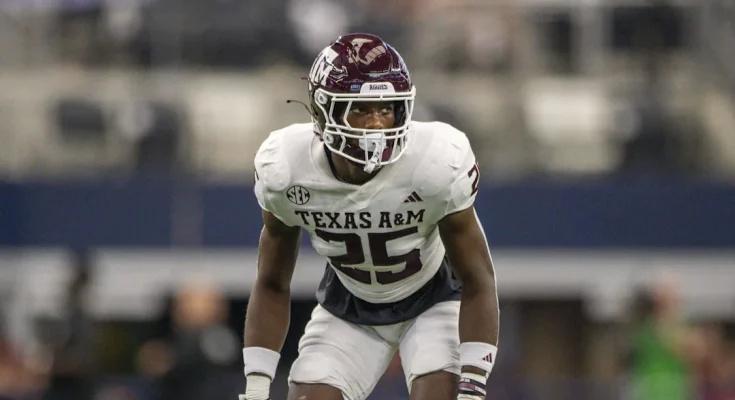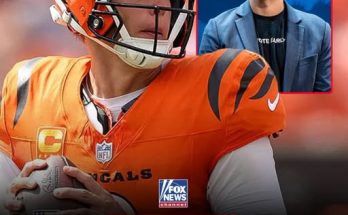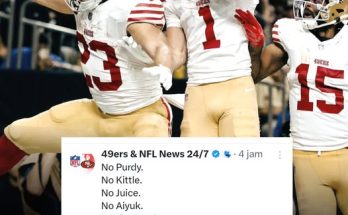The Texas A\&M football program has found itself thrust into the spotlight for all the wrong reasons following the arrest of standout safety Dalton Brooks. According to law enforcement reports out of Brazos County, Brooks was taken into custody on a pair of misdemeanor charges related to a vehicle collision that occurred earlier this week. While the details continue to emerge and the university has yet to make a definitive public statement, the situation is already stirring considerable concern among Aggie fans, football analysts, and those within the program who saw Brooks as a key defensive contributor heading into the 2025 season.
Dalton Brooks, a former five-star recruit out of Shiner, Texas, was considered one of the gems of Texas A\&M’s secondary and a building block for the future of their defensive backfield. A highly sought-after athlete during his high school career, Brooks came to College Station with the kind of accolades that rarely go unnoticed. With elite speed, solid instincts, and a nose for the football, Brooks had started to carve out a significant role for himself in the Aggie defense under head coach Mike Elko, who is in his second season leading the program after a turbulent transition following Jimbo Fisher’s departure.
According to the official police report, Brooks was arrested after being involved in what authorities are calling a “minor collision with complicating circumstances.” While no one was reported seriously injured in the crash, further investigation allegedly revealed that Brooks was in violation of several traffic laws, including failing to remain at the scene and providing false information to law enforcement. These factors led to the misdemeanor charges of leaving the scene of an accident and obstructing governmental operations.
From a legal standpoint, misdemeanor charges may not seem especially severe in isolation, but the context in which they occur can significantly impact how the public, media, and institutions perceive them. In the world of college athletics—especially within the high-stakes environment of SEC football—these charges can carry ramifications beyond the courtroom. For Dalton Brooks, whose reputation had largely been squeaky clean prior to this incident, the arrest is a major blemish and could severely affect his standing both within the team and in the eyes of NFL scouts who had already begun to take notice of his play.
What makes the situation even more complicated is the timing. Texas A\&M is just weeks away from beginning fall camp in preparation for what is expected to be a pivotal season. Coach Mike Elko has been attempting to build momentum in his second year, emphasizing discipline, accountability, and culture reset after years of inconsistency under Fisher. Brooks had emerged as a leader in the locker room, and losing him—even temporarily—could create a void that’s hard to fill in a secondary that was already facing depth challenges.
The Aggies’ defensive staff had been counting on Brooks to anchor the back end of their defense alongside a mix of veterans and promising underclassmen. His ability to cover ground, read the quarterback, and make plays in open space made him indispensable in the defensive scheme. Analysts had projected that Brooks was poised for a breakout season, potentially putting him on the radar for All-SEC honors if his performance matched expectations. Now, that trajectory has been interrupted, and the fallout could impact more than just Brooks’ individual season.
Texas A\&M’s athletic department has so far issued a brief statement acknowledging awareness of the incident but offering no additional details while the legal process plays out. “We are aware of the situation involving one of our student-athletes and are gathering more information. We take all allegations seriously and will allow the legal process to run its course before making any further comments,” the statement read. This approach, while cautious and standard, does little to quell the speculation surrounding Brooks’ future with the team.
Social media reactions have been swift and polarized. Some fans have expressed disappointment, demanding immediate accountability and potential suspension from team activities, while others have called for patience and understanding, urging the public not to rush to judgment without full facts. The latter group has pointed out that Brooks has never previously been involved in any off-field controversy and deserves the benefit of the doubt. Still, in the age of instant media and highly scrutinized college athletics, public opinion can quickly shift tides.
It’s also important to consider how Brooks’ teammates might be affected. A player with his profile and standing doesn’t just contribute with his play on the field—he also sets a tone in practice, in the weight room, and within the broader team dynamic. Depending on the coaching staff’s response, the locker room could either rally in support of Brooks or be left divided by uncertainty. It will fall on Coach Elko and his leaders on the roster to navigate this delicate balance in the coming days.
Brooks’ arrest also raises broader questions about how college football programs handle legal issues, discipline, and public relations. At a time when name, image, and likeness (NIL) deals have increased scrutiny on athletes’ off-field behavior, the stakes are even higher. Universities are now tied more than ever to their student-athletes’ public image, especially those with star potential. While misdemeanor charges may not disqualify a player from continuing their career, they can jeopardize endorsement opportunities and, in some cases, eligibility—depending on how the situation is handled internally.
Another aspect to consider is Brooks’ personal development and how this episode could influence his future. At just 20 years old, he still has time to learn, grow, and potentially turn this setback into a teachable moment. Many young athletes have faced legal and behavioral missteps early in their careers, only to emerge more mature and resilient. Whether Brooks can follow that trajectory will depend not just on the legal outcome but on the support system around him and his own willingness to take accountability.
The path forward for Brooks likely involves a mix of legal proceedings, possible disciplinary action from the university or team, and public reflection. Depending on the outcome of the investigation, he could face anything from a slap on the wrist to a multi-game suspension. The university’s student code of conduct may also play a role in determining whether Brooks is allowed to remain in good standing as a student-athlete, especially if additional facts emerge that suggest more serious violations.
Looking ahead, the Aggies will need to quickly determine how to proceed in their defensive backfield without potentially one of their best players. There’s no question that this development complicates what was already a challenging preseason. Texas A\&M is scheduled to face tough non-conference opponents early in the season before diving into the grueling SEC slate, where defensive lapses can cost games in an instant. The coaching staff will likely look toward younger players and transfers to fill the gap, but the loss of experience and leadership from someone like Brooks is difficult to quantify.
What also hangs in the balance is Brooks’ long-term football career. Scouts and talent evaluators will be watching closely to see how he handles adversity. For NFL hopefuls, character is becoming just as important as athletic prowess. Teams want players who represent the organization well both on and off the field, and any indication of poor judgment or off-field issues can cause draft stock to plummet. Brooks will have to demonstrate growth and maturity not just through his words but also his actions moving forward.
There is no denying the potential Dalton Brooks possesses as a football player. His athletic ceiling remains high, and his on-field instincts have already shown glimpses of greatness. What remains to be seen is how he handles the off-field adversity now in front of him. College football has a way of spotlighting both triumphs and setbacks with equal intensity. For Brooks, this moment is a crossroads—one that will define how he is remembered not just in College Station but across the landscape of the sport.
The next few weeks will be critical for all parties involved. For Texas A\&M, the priority will be maintaining focus and unity within the locker room while navigating what is clearly a distraction during a vital period of preparation. For Brooks, it will be about facing the consequences of his actions, participating fully in any legal and disciplinary process, and showing that he can rebound with maturity and purpose. The world of college football is filled with stories of redemption, second chances, and players who overcome early missteps to forge incredible careers. Dalton Brooks now has a chance to write his own version of that narrative—if he chooses to do so.



